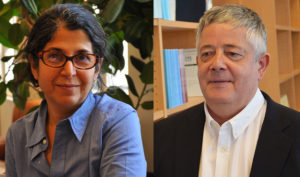February 28, 2020

ADELKHAH and MARCHAL
. . . longtime partners now want to marry
Two French researchers held for months in a Tehran prison on charges of violating Iran’s state security laws have petitioned prison authorities to allow them to wed, their lawyer has announced.
The two — Fariba Adelkhah and Roland Marchal, both in their 60s — filed separate requests to Evin prison authorities, according to their lawyer, Saeed Dehghan. He also expressed concerns February 7 for Adelkhah’s deteriorating health amid a hunger strike that she has been on since December.
Iranian officials disclosed last July that Adelkhah, a dual French-Iranian national and a prominent anthropologist who often traveled to Iran for research on post-revolutionary Iranian society, had been arrested on espionage charges. Those charges were later dropped but security-related charges remain against her.
Adelkhah’s fellow researcher Marchal was arrested after he came to Iran to visit her, France revealed in October. He is being held in the men’s ward in Evin on charges of spreading propaganda.
In December, France summoned the Iranian ambassador in Paris, saying it considered the months-long detention of Adelkhah and Marchal “unacceptable” and sought permission for consular officials to visit them, which international law requires Iran to grant in the case of foreign citizens, which Marchal definitely is.
Dehghan told The Associated Press that the French Embassy has had consular access only to Marchal. Iran doesn’t recognize dual nationality for its citizens.
He said the pair has been partners for 38 years in France.
“If permitted to marry, they will be able to meet and see each other inside the prison,” he said, explaining that Iranian laws prohibit extra-marital relations.
In December, Adelkhah went on hunger strike to protest her and Marchal’s detention. Her lawyer annnounced February 12 that she had ended the hunger strike after six weeks.
The last such foreign prisoner to be freed was in December when Tehran unilaterally freed a Chinese-American scholar from Princeton who had been held three years on widely criticized espionage charges.
Earlier, two Australians were freed in October while Australia freed an Iranian in what appeared to be a prisoner swap.












